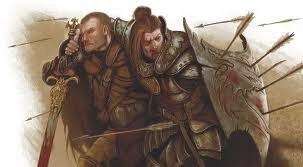When someone mentions Dungeons & Dragons, it conjures images of the deepest, darkest depths of nerd-dom: a bunch of guys sitting around a table, rolling dice and moving miniatures across a grid while play-acting as fantastical heroes. And, for the most part, those portrayals are accurate.
Playing D&D does involve plenty of what some people may perceive as silly behavior best reserved for children under 10. Yes, we are playing toys and having "imagination time" while we chug Mountain Dew and eat corn chips. But we are also doing so much more.
Dungeons & Dragons is an exercise in cooperative story-telling. It is a surprisingly social experience because every player is taking part in weaving a tale. This story can be about anything -- From plucky heroes adventuring to save a princess from a castle to a band of ne'er-do-wells out to make a fortune, godsdamn everybody else! The only limit is the players' imagination.
It's different from playing video games where, for the most part, what you do and how you do it is determined by the developers and is essentially the same for everybody who plays it. In D&D, the players decide who they want to be, what they do, and how they do it. This is a freedom that no video game could ever give.
 |
| The mighty d20 - the master of all your fates |
Within this framework of rules, the players can customize and craft their characters however they wish. The many books provide a myriad of options. Do you want to be a stealthy rogue? What's your style? Do you want like to get up and personal and slit your enemies' throats or shoot at them from a cover with your trusty crossbow? Maybe you want to be more of an acrobat instead, leaping and flipping about like Yoda on crack. Or perhaps this business is too plebeian for someone of your intelligence; perhaps zapping them with a lightning bolt is more to your liking.
Remembering and managing this menagerie of madness and rules and counter-rules seems a daunting task, but fortunately the newest edition of D&D has proven to be accessible and easier to manage than previous versions. If you're lucky, you'll also get the chance to play with more experienced players and a helpful Dungeon Master.
Now, who is the Dungeon Master? The mysterious man behind the painted screen, shuffling papers, laughing evilly as he rolls his dice - Is he the Great Enemy, the foe to be vanquished by the heroes? It's a common misconception that D&D is the Dungeon Master versus the players. As mentioned earlier, Dungeons & Dragons is a cooperative story-telling experience. A Dungeon Master's goal is to provide a fun, memorable experience for his friends. Sometimes, this means crafting encounters that test their abilities, putting their lives at risk, and doing everything in his power to kill them. Other times, it's about throwing them a bone, covering them in gold coins and treasure and (imaginary) women.
 |
| I apologize for the vulgarity, but it's just too good. |
The best part about being a Dungeon Master is being able to tell a story. It's like writing a novel, except you have the input and help of five other guys. Sometimes this can take the story to places you'd never expect. I've had players die tragically, heroically, or a mix of the two. But in the end, when the campaign is done and over with, you have a memory that you can share with your buddies.
It does seem silly. I've imagined how funny it'd be to be at my friend's wedding, elbowing him in the rib and saying, "Remember that time you jumped onto the dragon's back and rode it into the mountain?" To anybody else, it sounds like crazy talk. But to the people involved with the adventure, who were invested emotionally in the story, it's like remembering a good movie or book, except that you were in it.
I love D&D because I can use my creativity to its fullest. Like writing a well-crafted fantasy epic, I have to create or adapt whole worlds, their cities, their people, and their monsters for the adventures of my friends. I have to keep in mind that a good story should have the freedom to explore itself -- to go where it will -- and that a good writer is simply along for the ride.
And now, for what is perhaps the best parody of a D&D session (primarily, because it's so true):





Nice article, haven't played in a while, I miss it :)
ReplyDeleteNice post.
ReplyDeleteHow to Translate Essay to Spanish